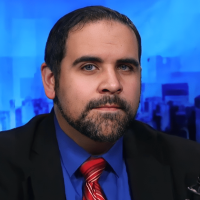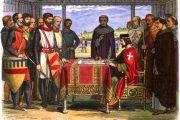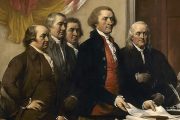Congressman Lawrence McDonald had served as a medical doctor, an officer in the U.S. Navy, a U.S. Representative from Georgia, and the chairman of The John Birch Society before being invited (along with several other members of Congress) to attend a celebration of the 30th anniversary of the signing of the United States–South Korea Mutual Defense Treaty in Seoul. McDonald was aboard Korean Air Lines flight 007 en route to the event when the plane was shot down by a Soviet fighter jet — 27 years ago — on September 1, 1983. Although history has all but forgotten Larry McDonald and the sacrifice he made for this country and freedom, we here at The New American have not forgotten and never will.
Larry McDonald was born on April 1, 1935 in Atlanta, Georgia. At the age of 17, he was admitted to Emory University School of Medicine and in 1957 was graduated with his M.D. He then joined the U.S. Navy, serving on active duty for four years as a Navy physician and flight surgeon. For the duration of his life, McDonald remained in the Naval Reserve and was eventually promoted to the rank of Captain.
In 1968, while still a resident surgeon at the University of Michigan Hospital, in Ann Harbor, Larry McDonald made his first bid for political office, running as a Democrat. During his campaign for a local committeeman position, McDonald ran as an “historic” or “True Democrat,” harking back to the old Democratic Party of Jefferson, Jackson, and Grover Cleveland. Although he lost the primary race to the incumbent liberal Democrat, McDonald later told a close friend that it was in that campaign that he gained the experience to run for Congress later in Georgia.
In 1974, after a tough primary battle in the Democratic Party, McDonald was elected to Congress, slipping by his Republican challenger Quincy Collins, by a margin of 549 votes out of the more than 95,000 votes cast.
On April 29, 1975, newly-elected Representative McDonald addressed the floor of the House for the first time. He criticized the gradualist “no-win war” strategy in the Vietnam War, strongly emphasizing the Communist “bloodbath” that was to come to the people of South Vietnam.
By the end of his first term in the House he had earned the respect and admiration of his colleagues in Congress; “Mr. Conservative” Senator Barry Goldwater said that Larry McDonald had “contributed more to the Congress than … any other freshman who has ever come here.” Goldwater’s remark wasn’t the only conservative approval McDonald garnered — he was universally respected by constitutionalists inside and outside of government.
During his tenure in office, Congressman McDonald always scored a solid 100 percent in “The Conservative Index,” then published in The Review Of The News (the predecessor to The New American). McDonald also scored a 100 percent rating from both Americans for Conservative Action and the National Conservative Political Action Committee’s (NCPAC) “Conservative Index.”
Larry McDonald was known for his staunch constitutional conservative principles and fervent anti-Communism. He was an advocate of a constitutionally-limited government, school prayer, sound money (i.e. Austrian economics), the reinstallation of the House Internal Security Committee, and America’s mutual defense alliances with the anti-Communist governments of Taiwan and South Korea.
Today, with the news of Russian espionage penetration in the United States and Communist subversion in the State Department, Larry McDonald’s call for the reinstallation of the nation’s former internal security structure is more relevant today than ever.
Before voting on an issue, he always asked himself the following three questions: (1) Is it Constitutional? (2) Do we need it? (3) Can we afford it?
Given these strict standards, it should come as no surprise that he voted “No” a great many times. At the 50th anniversary celebration of The John Birch Society, Congressman Ron Paul stated that there have been two “Dr. No’s” in the House, referring to himself and to his dear friend Larry McDonald. Dr. McDonald and Dr. Paul cast the only “No” votes for the Swine Flu Vaccination Program of 1976, signed by President Gerald Ford. It was later revealed that the vaccinations resulted in 500 cases of Guillain-Barré syndrome and 25 deaths.
In the area of internal security, McDonald worked vigorously to reestablish the House Committee on Internal Security and many of the other internal security measures originating with the McCarran Act of 1950. He also established Western Goals Foundation, a private intelligence network composed of former FBI and other intelligence personnel, high-ranking military officers, and other qualified experts, all sharing the goal of making impossible any merger of the United States and the Free World with the totalitarian world.
In 1982, Western Goals Foundation produced a definitive documentary on terrorism and subversion entitled No Place to Hide. In an interview from the documentary, McDonald says, “Yes we are at war — very definitely, we have been at war; it’s an economic war, it’s a war of subversion, it’s a war of espionage, it’s a war of ideas, and it’s a war of terrorism and it’s a war of infiltration.”
The documentary also featured an exclusive interview of Larry Grathwohl, the only FBI agent ever to infiltrate successfully the Weather Underground terrorist group. This footage was used on the Glenn Beck Show.
Aside from his political activism, Dr. McDonald was also a noted surgeon at the McDonald Urological Clinic. He served as acting Chairman of the Georgia State Medical Board, was a charter member of the Economic Monetary Investment Research Society, and served on the Economic Committee of the Association of American Physicians and Surgeons.
Almost three months before his fateful flight, McDonald succeeded Robert Welch as leader of the John Birch Society. Around the same time, Congressman McDonald was also appointed chairman of the Special Operation Forces Panel of the House Armed Services Committee.
While McDonald was en route to give his speech in Seoul, Soviet fighter jets identified and fired upon his plane over Soviet airspace. While he and the rest of the passengers were presumed killed, their eventual fate has been the subject of several conflicting reports. For example, in the years following the shootdown, evidence has arisen suggesting that flight KAL 007 was either forced down or safely crash-landed on Sakhalin Island, off the east coast of the Soviet Union just northwest of Japan.
In 1991, Robert W. Lee of The New American wrote an extensive article in which he explored what may have happened to the plane and its surviving passengers. Today Bert Schlossberg runs a website dedicated to the victims of flight 007, in which he also addresses the possible fate and whereabouts of the survivors, including Larry McDonald. Schlossberg also discusses the fate of the plane and its passengers in his book Rescue 007.
There can be no dispute, however, about McDonald’s distinguished role as one of the leading American patriots of the 20th Century.
Twenty-seven years later, Larry McDonald has yet to be bestowed the recognition he deserves in history, an oversight that we hope can begin to change as more Americans continue to learn about him and take the time to honor him on September 1st.
Photo of Rep. Larry McDonald: AP Images





